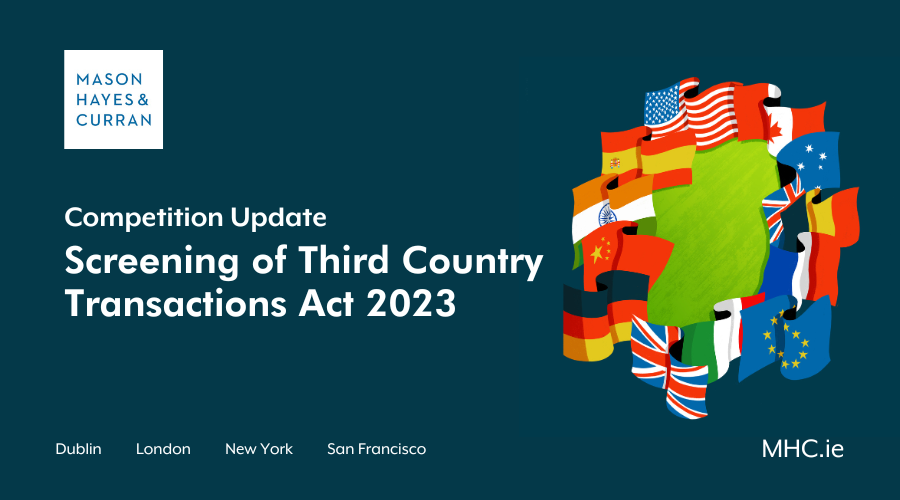Screening of Third Country Transactions Act 2023
Key features of Ireland’s first investment screening regime

The Screening of Third Country Transactions Act 2023 commenced on 6 January 2025. Our Competition, Antitrust & Foreign Investment team outlines the key aspects of the regime and considers the types of transactions which are caught by the Act.
The Screening of Third Country Transactions Act 2023 (the Screening Act) introduces the State’s first investment screening regime and implements Regulation (EU) 2019/452 (the EU Screening Regulation).
The Screening Act commenced on 6 January 2025 and enables the Minister for Enterprise, Trade and Employment to review certain transactions involving foreign investors for potential risks to the security or public order of the State. The Minister has published detailed ‘Inward Investment Screening Guidance’ (the Guidance), which helpfully clarifies several elements of the Screening Act.
Key features
Key aspects of the new regime are:
Mandatory and suspensory: The Screening Act introduces a mandatory and suspensory notification regime, similar to merger control. If a transaction meets the four criteria listed below, the parties must notify it to the Minister and obtain approval before completion. The only exception is for transactions that complete by 15 January 2025, which may be notified post-closing within 30 days of completion.
1. Investor from outside the Single Market: a “third-country undertaking”, ie from outside the EEA and Switzerland, or a person connected with such an undertaking, directly or indirectly:
- Acquires control of an asset or an undertaking in the State, for the first time or to a greater extent, or
- Changes the percentage of shares or voting rights in an undertaking in the State above 25% or 50%
The Guidance confirms that the Screening Act applies to direct and indirect investment from a third country. Therefore, a ‘third country’ investor using an EEA- or Swiss-incorporated acquisition vehicle is in scope.
The Screening Act also applies to EEA and Swiss investors if they are closely connected with a ‘third country’. This can include family relationships, acting as a trustee for beneficiaries from a third country, or being in partnership with a third-country undertaking or national.
2. Value of transaction is at least €2 million: the cumulative ‘value of the transaction’ and other transactions between the parties is at least €2 million in a period of 12 months before the date of the transaction. The Guidance confirms that this threshold relates to the entire value of the transaction, ie the consideration being paid by the acquirer, including any international dimension.
3. Not an internal reorganisation: a transaction is not required to be notified if the same undertaking, directly or indirectly, controls all the parties to the transaction.
4. Transaction relates to, or impacts on, one or more critical sectors: The Guidance helpfully confirms that an Irish nexus requirement applies to the following critical sectors. This means that the target must operate the “critical” element of its business, or the critical infrastructure must be located, in Ireland.
- Critical infrastructure, whether physical or virtual, including energy, transport, water, health, communications, media, data processing or storage, aerospace, defence, electoral or financial infrastructure, and sensitive facilities, as well as land and real estate crucial for the use of that critical infrastructure. The Guidance clarifies that a notification will only be required where the infrastructure in question comes within one of the categories listed in Annex 1 of EU Directive 2022/2557 (the CER Directive) or is in scope of EU Directive 2022/2555 (the NIS Directive), and an incident would have “significant disruptive effects”, which must be determined on a case-by-case basis by reference to a prescribed list of factors.
- Critical technologies and dual use items, including artificial intelligence, robotics, semiconductors, cybersecurity, aerospace, defence, energy storage, quantum and nuclear technologies as well as nanotechnologies and biotechnologies. The Guidance clarifies that a technology is critical, and within scope, if it is listed as either a dual-use item in Annex 1 of the EU’s Dual Use Regulation (Council Regulation 2021/821), or as military technology or equipment in the EU’s Common Military List (Council Common Position 2008/944/CFSP).
- Supply of critical inputs, including energy or raw materials, critical medicines, as well as food security.
- Access to sensitive information, including the ability to process, licence, sell or store such data. The Guidance states that sensitive information is data that must be protected from unauthorised access and may be business, government or personal data interpreted in accordance with the definition of Special Category Data under the GDPR.
- The freedom and pluralism of the media. This category includes media businesses operating, selling or otherwise active in the State. The Guidance clarifies that the level of activity of the media business in the State, based on sales, subscribers, viewers or other relevant metrics, must be substantive to trigger mandatory notification.
Asset acquisitions: the object of the transaction may be an asset, provided there is an acquisition of ownership or the right to use all or part of an asset. The Guidance provides that an asset does not need to be an asset constituting a business to which a turnover is attributable. For example, the sale, acquisition or licencing of IP rights or a leasehold or licence over a premises could, in certain circumstances, give rise to a notification requirement.
Target or part of the target must be ‘in the State’: an asset is deemed to be ‘in the State’ when it is physically located in the State or, in the case of an intangible asset, owned, controlled or otherwise in the possession of an undertaking in the State. An undertaking is ‘in the State’ when it is constituted or otherwise governed by the laws of the State or has its principal place of business in the State.
Multi-party obligation to notify: the notification obligation rests on all parties to a transaction meeting the relevant criteria, unless they are not aware of the transaction. Joint notifications are possible and are expected to be the norm.
“Call in” powers: the Minister may “call in” for review notifiable transactions that are not notified, referred to as ‘non notified transactions’. Similarly, transactions that are not notifiable may be called in for review, where the Minister has reasonable grounds for believing the transaction affects, or would be likely to affect, the security or public order of the State. The Guidance clarifies that this power is aimed at new or emerging technologies or sectors that are not captured by the mandatory notification criteria set out in the Screening Act.
The Minister must exercise the ‘call in’ power within 15 months of the transaction being completed in the case of transactions that are not notifiable. In the case of non-notified transactions, the applicable time limit is the later of 5 years from completion or 6 months from the Minister becoming aware of the transaction.
Retrospective application: the Minister can ‘call in’ for review any transaction that completed not more than 15 months before the commencement of the Screening Act, ie after 1 October 2023.
No voluntary regime: the Screening Act does not provide for voluntary notifications.
Offence of gun-jumping: it is a criminal offence to complete, or take steps to complete, a non-notified transaction or a notified transaction under review by the Minister prior to the Minister issuing a screening decision clearing the proposed transaction or making it subject to conditions. Where the transaction is subject to a conditional screening decision, it is an offence to complete the transaction other than in accordance with those conditions.
Information requests: the Minister may request further information. Failure to comply with a ‘notice of information’ or the provision of false information in response is a criminal offence.
Lengthy review timeline: the Minister is required to make a screening decision within 90 days from the date on which the Minister issues a screening notice regarding the transaction. The 90-day review period may be extended to 135 days at the discretion of the Minister. The review period is suspended by the issuance of a notice of information and resumes on the date that the notice is deemed to be complied with. The Guidance confirms that the Department considers 90 days to be the outer bound of the statutory review period, not the target, and in practice many transactions will be cleared quicker.
Wide-ranging powers to impose remedies: the Minister may prohibit the transaction, or parts of it, or impose conditions. Conditions can include divestment requirements, behavioural requirements, ring-fencing requirements, and compliance reporting obligations.
Criminal sanctions: persons found guilty of an offence under the Screening Act may be liable, on summary conviction, to a fine not exceeding €5,000 and/or up to 6 months imprisonment or, on conviction on indictment, to a fine not exceeding €4 million and/or up to 5 years imprisonment. Depending on the facts, both the undertaking and any director, manager, secretary or other officer of the undertaking, or a person purporting to act in that capacity, may be guilty of an offence and held liable.
Appeals: parties to a transaction may appeal a screening decision to an independent adjudicator and must notify the Minister that they are appealing no later than 30 days after being notified of the screening decision. The appellant must submit the appeal to the adjudicator within 14 days after providing notice to the Minister. A decision of an adjudicator may be appealed on a point of law to the High Court.
Conclusion
The Screening Act is one of the most significant developments in Irish M&A in recent years. It has the potential to cast a wide net. Investors should be thinking now about key questions such as:
- Does the transaction meet the criteria for a mandatory notification?
- Are investment screening warranties required?
- Should provision be made in the deal documentation for a potential notification?
- What is the potential impact of a notification on the deal timeline?
- What remedies could be required by the Minister to address any public order and/or security concerns?
- If the transaction is not mandatorily notifiable or has closed since 1 October 2023, is it at risk of being called-in for review by the Minister?
Early engagement on these and other questions is advisable. Please get in touch with a member of our Competition, Antitrust & Foreign Investment team for more information.
Frequently asked questions
When does investment screening come into effect in Ireland? |
Ireland’s investment screening regime entered into force on 6 January 2025. |
Why is the Screening Act noteworthy? |
It requires all parties to a relevant transaction to notify and receive approval from the Minister for Enterprise, Trade and Employment before closing can occur. Failure to notify a notifiable transaction is a criminal offence punishable by fines and prison sentences. |
When is a notification required to be made? |
A transaction must be notified where the following four conditions are satisfied: (a) an acquirer from outside the EEA or Switzerland will, directly or indirectly, acquire control of an asset or an undertaking in the Republic of Ireland, or change the percentage of shares or voting rights it holds to above 25% or 50%; (b) the entire value of the transaction and related transactions between the parties is at least €2 million; (c) the transaction is not an internal reorganisation; and (d) the transaction relates to, or impacts upon, one or more of the broadly defined critical matters. |
What sectors are considered critical under the Screening Act? |
Under the Screening Act, the following matters are critical: critical infrastructure, critical technologies and dual use items, the supply of critical inputs, access to sensitive information and the freedom and pluralism of the media. Legal advice should be sought to determine whether the transaction comes within scope of these critical matters. |
What transactions are exempt from notification? |
The only express exemption in the Screening Act relates to internal reorganisations, ie where all parties to the transaction are controlled by the same undertaking. Other types of transactions, including greenfield investments, the creation of a joint venture, and debt for equity swaps are not exempt but in practice will only be notifiable to the extent they involve the acquisition of an asset or an undertaking in the State and satisfy the other mandatory criteria outlined above. |
How long does the review process take? |
The standard length for the review process is 90 calendar days from the date that the Minister issues a screening notice. The Minister can extend the review period to 135 calendar days at its discretion. The Minister may also stop the clock during the review process by issuing a notice of information. The review timeline restarts on the date that the Minister deems that the notice has been complied with properly. |
What transactions can the Minister “call in” for review under the Screening Act? |
The Screening Act grants the Minister the power to call in for review transactions which have not been notified that the Minister has reasonable grounds for believing would likely affect the security or public order of the State. The Minister must exercise this power within 15 months of completion for transactions which do not satisfy the mandatory notification test. In the case of non-notified transactions which are eligible for notification, the Minister has 5 years from completion or 6 months from the Minister becoming aware of the transaction. In each case, the Minister may call in for review transactions that completed before the commencement of the Screening Act, provided completion did not occur more than 15 months prior to commencement ie, before 1 October 2023. |
The content of this article is provided for information purposes only and does not constitute legal or other advice.
Share this:







